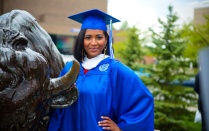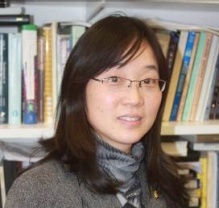Xiangqun Zeng, PhD '97
Degree: PhD in Chemistry
Advisor: Professor Stanley Bruckenstein
Thesis Title: "Study of Underpotential Deposition of Mercury, Copper, and Lead on Gold: A Parallel Study by RRDE, EQCM, XPS and ToF-SIMS"
Describe the timeline of your professional life since graduation from UB.
After graduation, I did one year postdoc to study the kinetics and thermodynamics of conductive polymers during redox switching at Buffalo. Then, I worked as a tenure track assistant professor at Chemistry Department of University of Wisconsin Oshkosh from Sept. 1998 to July 2001. I have been a professor of chemistry at Oakland University in Rochester, MI, first as a tenure track assistant professor (2001-2005), tenured associate professor (2005-2011), full professor (2011-2018) and distinguished professor (2019-present).
Describe your position and your responsibilities (i.e. What do you do?).
As a professor at Oakland University, my main responsibility is teaching, research and service. I teach a variety undergraduate and graduate level courses in Analytical Chemistry and Electrochemistry. I am also a principal investigator for a range of research projects. My lab studies fundamental and applied interfacial phenomena, or in other words, what happens on the surface of electrodes and then use these findings to design and build a variety of sensors to address important problems associated with the determination of materials and amounts of material that are important for medical, environmental and other fields funded by a range of agencies (NIH, NSF, NIOSH etc.). These projects are highly interdisciplinary which require significant collaborative efforts from a diverse group of individuals. I could not have achieved my research goals by myself. I have been fortunate to mentor and work with 80 students/postdoc/visiting scholar (23 postdocs, 8 visiting professors including one Fulbright scholar, 10 M.S. thesis and 7 Ph.D. thesis, over 20 undergraduate students, as thesis co-advisor for 5 Ph.D. and 1 M.S. students of other institutions). Besides teaching and research, I also serve as a member or chair of various committees in my department and University as well as scientific communities. I served over 50 federal grant review panels, and I also chair and/or co-chair of the symposia in the national and international meetings.
What in your experience at UB prepared you the most for your career?
My education at UB played pivotal role in my over 20 years academic career. At UB, my Ph.D. thesis research at Dr. Bruckentsien’s lab focused on the understanding of surface reactions and processes at electrode–electrolyte interface that are very fundamental. I also spent significant amount of time working at Dr. Joseph Gardella’s lab for surface characterization of the modified electrodes using XPS and ToF-SIMs. This unique research of exploiting multiple analytical techniques to understand the fundamental chemistry at surface and interface is extremely valuable for my own research program that is very interdisciplinary in nature. In my lab, we use multiple electrochemical, spectroscopic and microscopic techniques in order to determine the composition, structure and dynamic interfacial properties at electrode interfaces for a broad range of applications in environmental, health and energy. UB chemistry graduate program also emphasizes on teaching and communication skills that has been invaluable for me to learn about the American academic system and culture.
Can you offer a few words of advice for current UB students?
The biggest challenges facing the world today are climate change, energy efficiency, and the healthcare needs of an aging population. Chemistry is essential to solve these complex and multidisciplinary problems. My advice for chemistry graduates is to learn as much fundamental science as possible and have a flexible and open mind for new applications.


